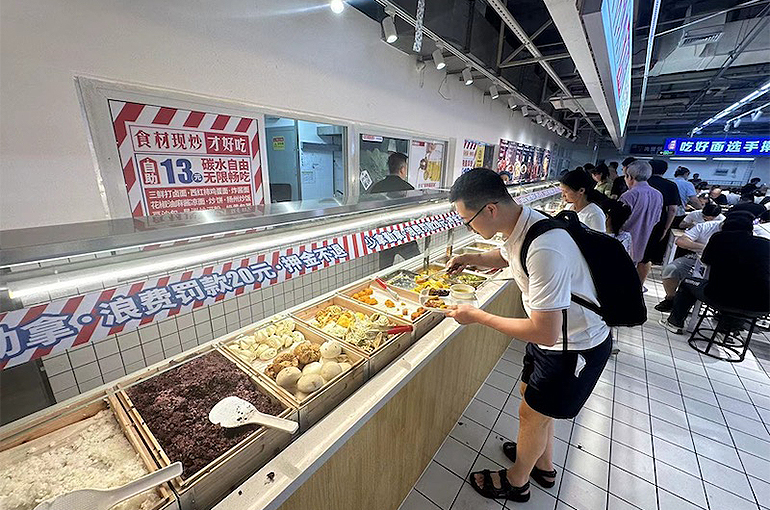 Chinese Supermarkets Turn to Fast Food to Lure Customers
Chinese Supermarkets Turn to Fast Food to Lure Customers(Yicai) July 17 -- Brick-and-mortar supermarkets in China have recently started opening dining sections, offering affordable and delicious meals to customers, to win back customers amid cut-throat competition with online vendors.
Wumart Stores’ outlet in Beijing’s Zhongguancun area has a ‘great canteen,’ that offers a rich variety of meals at an affordable price to people for lunch and dinner. The buffet service provides customers with two options, with one cost CNY13 (USD1.80) and the other CNY19.9, coving over 60 dishes.
When the fast-food section first opened, there were more than 1,000 people coming to eat each day, a staff member told Yicai. Most of them are people who work in the vicinity.
Following the success of its Zhongguancun store’s canteen, Wumart plans to roll out more in-store restaurants, the person said. The Beijing-based company intends to have 20 outlets with fast-food sections by the end of the year.
Supermarkets are facing intense competition from e-commerce and members-only stores. To attract more customers, they not only need to offer discounts and promotions but they also need to provide services that increase customer loyalty, said Shen Jun, a senior retail analyst. Although they hardly make any money, affordable canteens can quickly attract customers from the surrounding area.
Other supermarket chains such as Yonghui Superstores and Alibaba Group Holding's Freshippo are also opening fast-food sections. The restaurants in Yonghui and Wumart outlets are fully self-operated, while Freshippo has teamed up with partners.
"There are stalls in each store that are operated by a partner offering specialty dishes such as shredded chicken and beef soup, but there are also meals made in-house by the stores themselves," an insider from Freshippo said.
Yonghui hopes to leverage the good locations of its community stores to provide better services to those living nearby by opening a fast food outlet, an insider at the Fuzhou-based company said.
However, whether customers will make incidental purchases after dining still depends on the quality and prices of the products in the store, a former manager at several supermarket chains told Yicai. Cost-effectiveness is crucial. And for store operations, it is even more critical to strengthen product development and improve their supply chains.
Editors: Tang Shihua, Kim Taylor